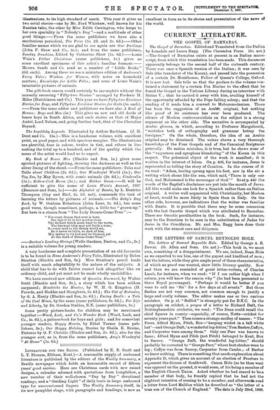C URRENT LITE RAT ETRE.
THE GOSPEL OF BARNABAS.
The Gospel of Barnabas. Edited and Translated from the Italian by Lonsdale and Laura Ragg. (The Clarendon Press. 163. net.) -The Gospel of Barnabas exists at present in an Italian manu- script, from which this translation has been made. This document apparently belongs to the second half of the sixteenth century. There was once a Spanish version of the Italian ; it was seen by Sale (the translator of the Koran), and passed into the possession of a certain Dr. Monkhouse, Fellow of Queen's College, Oxford. It is now lost. Sale tells us that the preface to the volume con- tained a statement by a certain Fra Marino to the effect that he found the Gospel in the Vatican Library during an interview with Sixtus V. ; that he carried it away with him, availing himself of the opportunity afforded by the Pope falling asleep; and that the reading of it made him a convert to Mohammedanism. There has been the suggestion of an Arabic original, but nothing like proof of its existence has ever been produced. The silence of Moslem controversialists on the subject is a strong argument on the other side. The narrative is accompanied by Arabic glosses, in which, according to Professor Margoliouth, " mistakes both of orthography and grammar betray the foreigner." On the whole, therefore, the idea of an Arabic original may be dismissed. The writer shows a very thorough knowledge of the Four Gospels and of the Canonical Scriptures generally. He makes mistakes, it is true, but he shows none of the "vagueness and egregious blundering" of the Koran in this respect. The polemical object of the work is manifest ; it is written iu the interest of Islam. On p. 406, for instance, Jesus is represented as telling the story of Creation. In the course of it we read : "Adam, having sprung upon his feet, saw in the air a writing which shone like the sun, which said, There is only one God, and Mohammed is the messenger of God." So at p.440 the words of the Baptist's disclaimer are put into the mouth of Jesus. All this would make one look for a Spanish rather than an Italian original. A writer well acquainted with Christianity, but Moslem at heart, would be more likely in Spain than in Italy. On the other side, however, are indications that the writer was familiar with Dante. It is possible that there may be some connexion with the lost Gnostic Gospel which was attributed to Barnabas. There are Gnostic peculiarities in the book. Such, for instance, may be the Docetism to be seen in the substitution of Judas for Jesus in the Crucifixion. Mr. and Mrs. Rugg have done their work with the utmost care and diligence.










































































 Previous page
Previous page